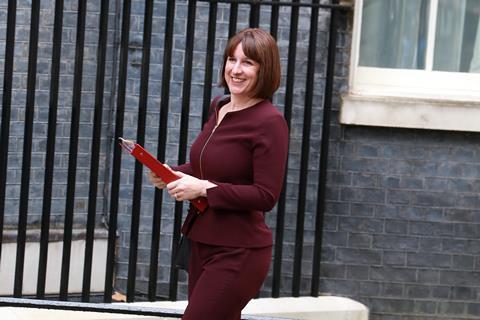The Financial Times has reported that the chancellor is planning to introduce a rent settlement of CPI + 1% for the next decade
The chancellor Rachel Reeves is planning to introduce a 10-year rent settlement in the Autumn Budget on 30 October, according to a report in the Financial Times (FT).

The settlement would reportedly allow social landlords to raise rents annually by the Consumer Prices Index (CPI) - currently 2.2%-, plus an additional 1%, each year for the next decade.
The current rent settlement is set at CPI + 1%, but expires in 2026 and affordbale housing sector bodies have been calling for a new, long-term settlement.
In a written statement on 30 July, the deputy prime minister and housing secretary said that the government will set out plans at the next budget “to give councils and housing associations the rent stability they need to be able to borrow and invest in both new and existing homes”.
>> See also:
>> See also:
The Ministry of Housing, Communities and Local Government (MHCLG) said it was not able to confirm that there will be a 10-year rent settlement or provide additional information ahead of the budget.
A spokesperson from MHCLG said: “Work is ongoing to fix the foundations of our housing and planning system and we will set out our plans at the next fiscal event.”
According to a National Housing Federation (NHF) spokesperson, the government has indicated that a 10-year rent settlement has not yet been decided upon.
However, the NHF said that calling on the government to create a long-term rent settlement remains a key priority. In April, the Department for Levelling Up, Housing and Communities (DLUHC) confirmed councils and housing associations will be able to increase their social housing rents by September’s Consumer Price Index figure plus 1% in 2025/26.
The NHF welcomed the extension but re-iterated its call for a 10-year rent settlement.
The last rent settlement was agreed in 2013 and was expected to last 10 years from 2015. However, changes have been made to the policy since 2015, such as a policy that required social landlords to reduce rents by 1% for four years from April 2016, a return to CPI + 1% in 2020, followed by a rent cap of 7% in 2023-24.
>> See also:
>> See also:
James Prestwich, director of policy and external affairs at the Chartered Institute of Housing (CIH) said: “It is clear that ministers and officials understand a rent settlement needs to provide certainty to landlords and investors, enabling housing providers to plan investment in social homes over the long term.
“Of course, this must also be balanced by the need for social rents to remain affordable for people living in social housing.”
Andy Hulme, chief executive of Hyde Group, said: ”“A ten-year, index-linked rent settlement, coupled with the urgent need for rent convergence, would give social housing charities the certainty we need to invest in the homes we provide and to continue playing our vital role in building new affordable homes. It would play a critical role in attracting additional private sector investment to build more homes.”
Yesterday, the G15, the group of London’s largest housing associations,.
The group said that to allow social landlords to borrow at cheaper rates, thereby facilitating the delivery of more affordable homes, social landlords need a long-term rent settlement lasting a minimum of 10 years.
However the G15 warned that the settlement must have “cast-iron gurantees” so it can’t be amended part-way through. In 2015 the government scrapped a previously agreed 10-year index-linked settlement and replaced it with four years of rent cuts.

























No comments yet